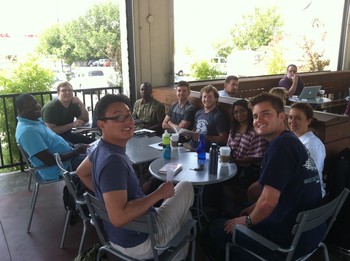Seminary interns are nothing new. Established churches and new churches alike serve as valuable training grounds for seminary students as they advance in their studies.
“What those (internships) don’t do is give you a taste of what it is like to start something from scratch,” said the Rev. Shannon Kiser, East Coast director for the Presbyterian Centers for New Church Innovation.
In thinking about strategies for the 1001 movement — which aims to create 1,001 new worshiping communities in the next 10 years — Kiser and other church-planting leaders knew they needed to provide grant money, training events and leadership coaching. But something was missing.
“We’ve also go to identify and recruit leaders for new worshiping communities,” she said. “1,001 new worshiping communities are going to need 1,001 new leaders — or more.”
So Kiser and other leaders developed an internship program to help people explore what it’s like to start something new.
The 10-week pilot program started in June and has 11 interns, with nine on the West Coast and two on the East Coast. This year’s interns are all seminary students or graduates, but seminary training isn’t a requirement for the program, Kiser said.
The interns are spending at least half their time out in their communities, meeting people and asking them questions about where they gather and what might be missing. Part of the work of building relationships has to do with learning the deeper story of a community, Kiser said.
“You begin to hear the deeper story and begin to connect with the parts where your heart breaks,” she said. “What speaks to me? That’s where I start.”
As the interns make these connections, they’re also gaining practical training for church planters: how to build relationships, read demographics, plan for financial stability, structure leadership and plan their days.
“How do you spend your time when your ministry is about intersecting with people in the community and building relationships?” Kiser said.
The interns will also spend some time with existing churches, observing how worship is planned and staff meetings are conducted. Program leaders are aware that seminaries have requirements for internships and are working to offer new opportunities while still meeting those requirements.
“We have got to bridge the great theological education that our seminaries offer with practical, on-the-ground work. This is one of the bridges we think can do that,” Kiser said.
At the end of the summer, the goal is for the interns to have some sort of gathering with the people they’ve met along the way.
“That does not have to be a worship service — and it probably won’t be,” Kiser said, adding that the gatherings could range from Bible study to a kickball game to an outreach project. “New worshiping communities don’t tend to start with worship. They tend to move toward worship.”
While it would be ideal to see these gatherings grow into lasting ministries, that isn’t the goal. Each group will have to determine its own path. It might be that a one-time gathering served a purpose, and people will move on. Or, it might be that the group will continue meeting on its own or connect with an existing ministry.
“There has to be some sort of closure,” Kiser said. “That’s part of what the intern and the participants are going to have to talk through — what makes sense to them?
“This actually does mirror a lot of the ‘1001’ mentality. We have to take risks and we don’t always know how they’re gonna pan out,” she said. “There will be some things that pan out and some that don’t, but Jesus will have been in all of them.”

